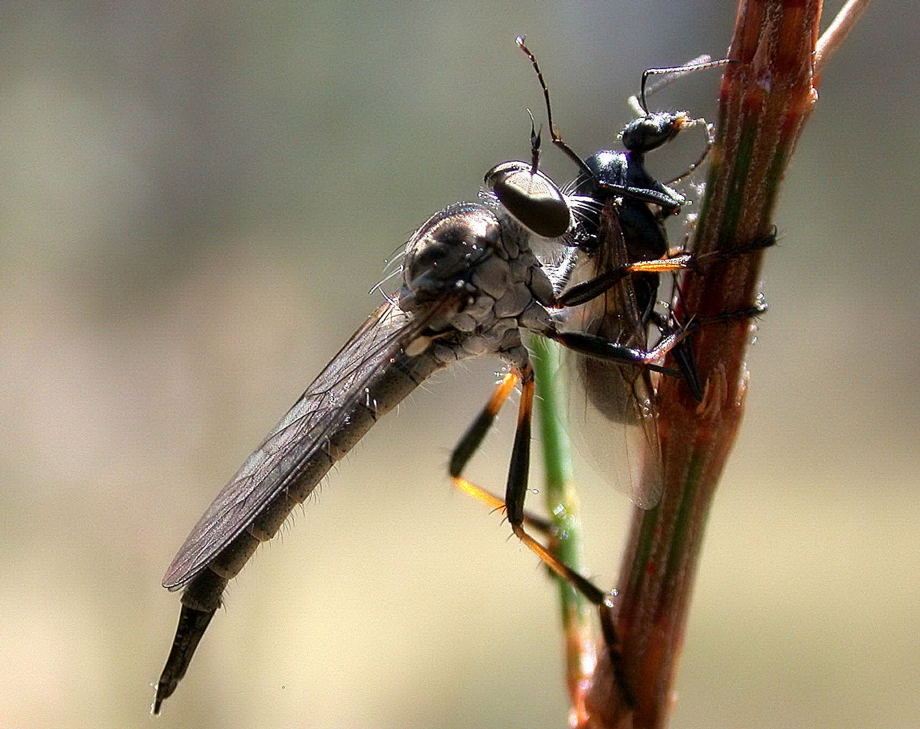Robber Flies - Family Asilidae
This page contains pictures and information about Robber Flies that we found
in the Brisbane area, Queensland, Australia.

- Robber Fly captured a winged ant
The Robber Flies are air hunter. They also known as an Assassin Fly and Bee Killer. They have strong legs which can catch prey on flight. They are medium to large size flies with large eyes and necked head. They are active predators on flying insects, unselective in prey species. They even prey on web weaving spiders. Their mouthparts are the triangular proboscis which insert into prey and suck the juice.
Most Robust flies are with noticeable "beard" of setae around the face. It is believed that they serve as protection to their face from damage by their prey.
- Most Robber Flies are reddish-brown in colour. Different species that we
found are looked similar and hard to be identified. Their
mouthpart is the large pointed proboscis. Their thorax and legs are hairy.
Their abdomen are long and thin. They are commonly seen in our backyard and in
the bushes in Brisbane.



- The mating pair The mating pair Taking off
- Female robber flies deposit creamy colour eggs on plants or in gaps within soil, bark, or wood. Egg-laying habits are different depend on species and habitat. Most species lay eggs in masses and are covered with protective coating. Robber fly larvae live in the soil or in rotting wood. Larvae are also predators, they feed on eggs, larvae and other soft-bodied insects.

- Rubber fly pupa empty case
- They pupate in the soil and move to soil surface emerge as adults (We have the Giant Robber Fly egg-laying observation in this page).
Subfamily Asilinae
- Robber flies in this subfamily have the wing vein R2+3 ending on R1, with slender antennal style. They are common in Brisbane bush. Most of them look similar and hard to be identified in species level.
Subfamily Ommatiinae
- This subfamily is very close related with Asilinae. They are sometimes put
together as Asilinae. Robber flies in this subfamily have the antenna in
plumose form, i.e., like a feather.


Subfamily Leptogasterinae
- Robber flies in this subfamily have cell R1 open to coastal margin. There is only one Australian genus, Leptogaster, in this subfamily.
They are small and very slender.

Subfamily Dasypogoninae
- Robber flies in this subfamily have the wing vein R2+3 open, ending on the wing margin. Their antenna terminal is sometimes thickened. The fore tibia with an apical spur; one of the spines at the apex of the ventral side of the fore tibia is enlarged. Some robber flies in this subfamily have orange or yellow marking on body or wings to mimic sphecid and vespid wasps.






Subfamily Laphriinae
- Robber flies in this subfamily have the wing vein R2+3 ending on R1. Their
antenna is three segmented and without terminal style. Some of them
are shiny metallic colour.




Robber Fly Attacked Spider

- Leptogaster sp., subfamily Leptogasterinae, body length 15mm
- Insects are not always be the prey of spiders. Some insects attack spiders. Robber Fly is one of those insects. On a early summer day afternoon, a medium size Silver Orb Wed spider was building its web. The spider had finished laying the frame threads and radius of the web and about to put on the sticky spiral silk. There was a medium size Robber Fly flying over the spider web. After the fly circled two rounds, it attacked the spider on its abdomen. The fly punch its mouth parts into the spider body. There was only very little struggling, then all become motionless. The Robber Fly start feeding the spider on the unfinished spider web. We believed if the spider web were finished, the Robber Fly may not win so easily.


- Robber Fly feeding on spider, fly body length 12mm.
- Reference:
- 1. Insects of Australia, CSIRO, Division of Entomology, Melbourne University Press, 2nd Edition 1991, p 757.
- 2. Insects of Australia and New Zealand - R. J. Tillyard, Angus & Robertson, Ltd, Sydney, 1926, p362.
- 3. Giff Beaton's Robber Flies (Asilidae) of Georgia and the southeast - by Giff Beaton, 2005.
- 4. Family ASILIDAE - Australasian/Oceanian Diptera Catalog - Web Version, by Greg Daniels.
- 5. Key to the subfamilies of Asilidae - after Artigas & Papavero1988, by Fritz Geller-Grimm 1998.
- 6. robber flies - Asilidae - by E. M. Finn, University of Florida, 2007.
- Leptogaster sp., subfamily Leptogasterinae, body length 15mm








